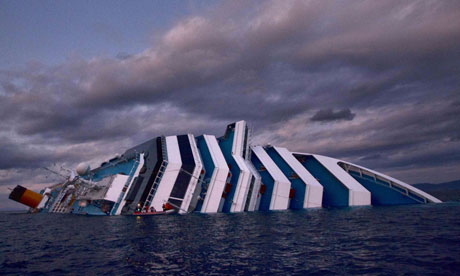‘Courage is a virtue and heroism is admirable, but do we
have a right to demand them? Which of us cannot look back on his or her own
life and remember decisions, or compromises made, or silences kept because of
cowardice, even when the penalties for courage were negligible?
If we are cowardly in small things, shall we be brave in
large? Have we the right to point the finger until we have been tested
ourselves? When we read of the seemingly lamentable conduct of the captain of
the Costa Concordia, Francesco Schettino, who left his passengers to their
fate, do we say, “There but for the grace of God go I”?
Of course, leadership
entails an obligation to be courageous – morally, physically or both. It is the
price of leadership; it is why leaders are more highly regarded and rewarded
than the rest of us. But even subordinates in certain professions have the
duty to be brave, as the rest of us do not. A soldier is expected
unquestioningly to put himself in the way of bullets as a civilian is not……….
What, then, might Captain Schettino say in his defence? Let
us, for the sake of argument, leave aside the possibility that the whole
disaster was an error of his seamanship, and suppose instead that it was what
some people call “one of those things”.
In a world used to the utilitarian zeitgeist, he might say
that if he had stayed on board and gone down with his ship, nobody who died
would have been spared. We imagine a captain on his deck, as he slips under the
waves, but this is quixotic romanticism if in fact no one is saved. A captain’s
life is worth as much as anyone else’s; nobody’s interest is served by his
needless death.
Can we be sure that if Captain Schettino had kept calm and
carried on, fewer people would have died? Can it be wholly his fault if the
crew were not properly trained and members of it were not even able to
communicate with each other, let alone with all the passengers? He could, of
course, have refused his command: but how many of us resign our jobs on a
matter of principle? If we were to do so, the unemployment rate would be nearly
100 per cent…………………………….
Could he have known in advance that he was not up to the
mark, that no man was less fitted than he for such an emergency? I hope it is
not taken for lack of sympathy for the victims and their relations to say that,
on the scale of human monstrosity, the captain does not climb very high. His
place on the scale of human weakness is another matter.’
For more, see: http://www.telegraph.co.uk/news/worldnews/9022832/Concordia-disaster-Should-a-captain-go-down-with-his-ship.html



No comments:
Post a Comment